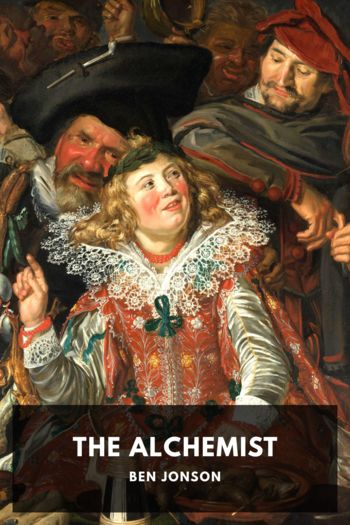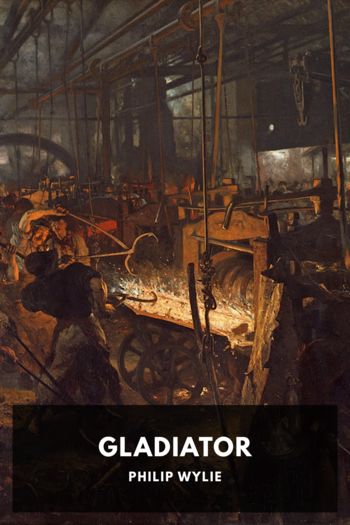Gladiator, Philip Wylie [sight word books txt] 📗

- Author: Philip Wylie
- Performer: -
Book online «Gladiator, Philip Wylie [sight word books txt] 📗». Author Philip Wylie
“Hey, Hugo!”
“Yeah?”
“What the hell did you come over here for?”
“To be alone.”
“Is that a hint?” Lefty entered the room. “They want you over at the bonfire. We’ve been looking all over for you.”
“All right. I’ll go. But, honest to God, I’ve had enough of this business for to-day.”
Lefty slapped Hugo’s shoulders. “The great must pay for their celebrity. Come on, you sap.”
“All right.”
“What’s the matter? Anything the matter?”
“No. Nothing’s the matter. Only—it’s sort of sad to be—” Hugo checked himself.
“Sad? Good God, man, you’re going stale.”
“Maybe that’s it.” Hugo had a sudden fancy. “Do you suppose I could be let out of next week’s game?”
“What for? My God—”
Hugo pursued the idea. “It’s the last game. I can sit on the lines. You fellows all play good ball. You can probably win. If you can’t—then I’ll play. If you only knew, Lefty, how tired I get sometimes—”
“Tired! Why don’t you say something about it? You can lay off practice for three or four days.”
“Not that. Tired in the head, not the body. Tired of crashing through and always getting away with it. Oh, I’m not conceited. But I know they can’t stop me. You know it. It’s a gift of mine—and a curse. How about it? Let’s start next week without me.”
The night ended at last. A new day came. The bell on Webster Hall stopped booming. Woodie, the coach, came to see Hugo between classes. “Lefty says you want us to start without you next week. What’s the big idea?”
“I don’t know. I thought the other birds would like a shot at Yale without me. They can do it.”
Mr. Woodman eyed his player. “That’s pretty generous of you, Hugo. Is there any other reason?”
“Not—that I can explain.”
“I see.” The coach offered Hugo a cigarette after he had helped himself. “Take it. It’ll do you good.”
“Thanks.”
“Listen, Hugo. I want to ask you a question. But, first, I want you to promise you’ll give me a plain answer.”
“I’ll try.”
“That won’t do.”
“Well—I can’t promise.”
Woodman sighed. “I’ll ask it anyway. You can answer or not—just as you wish.” He was silent. He inhaled his cigarette and blew the smoke through his nostrils. His eyes rested on Hugo with an expression of intense interest, beneath which was a softer light of something not unlike sympathy. “I’ll have to tell you something, first, Hugo. When you went away last summer, I took a trip to Colorado.”
Hugo started, and Woodman continued: “To Indian Creek. I met your father and your mother. I told them that I knew you. I did my best to gain their confidence. You see, Hugo, I’ve watched you with a more skillful eye than most people. I’ve seen you do things, a few little things, that weren’t—well—that weren’t—”
Hugo’s throat was dry. “Natural?”
“That’s the best word, I guess. You were never like my other boys, in any case. So I thought I’d find out what I could. I must admit that my efforts with your father were a failure. Aside from the fact that he is an able biology teacher and that he had a number of queer theories years ago, I learned nothing. But I did find out what those theories were. Do you want me to stop?”
A peculiar, almost hopeful expression was on Hugo’s face. “No,” he answered.
“Well, they had to do with the biochemistry of cellular structure, didn’t they? And with the production of energy in cells? And then—I talked to lots of people. I heard about Samson.”
“Samson!” Hugo echoed, as if the dead had spoken.
“Samson—the cat.”
Hugo was as pale as chalk. His eyes burned darkly. He felt that his universe was slipping from beneath him. “You know, then,” he said.
“I don’t know, Hugo. I merely guessed. I was going to ask. Now I shall not. Perhaps I do know. But I had another question, son—”
“Yes?” Hugo looked at Woodman and felt then the reason for his success as a coach, as a leader and master of youth. He understood it.
“Well, I wondered if you thought it was worth while to talk to your father and discover—”
“What he did?” Hugo suggested hoarsely.
Woodman put his hand on Hugo’s knee. “What he did, son. You ought to know by this time what it means. I’ve been watching you. I don’t want your head to swell, but you’re a great boy, Hugo. Not only in beef. You have a brain and an imagination and a sense of moral responsibility. You’ll come out better than the rest—you would even without your—your particular talent. And I thought you might think that the rest of humanity would profit—”
Hugo jumped to his feet. “No. A thousand times no. For the love of Christ—no! You don’t know or understand, you can’t conceive, Woodie, what it means to have it. You don’t have the faintest idea of its amount—what it tempts you with—what they did to me and I did to myself to beat it—if I have beaten it.” He laughed. “Listen, Woodie. Anything I want is mine. Anything I desire I can take. No one can hinder. And sometimes I sweat all night for fear some day I shall lose my temper. There’s a desire in me to break and destroy and wreck that—oh, hell—”
Woodman waited. Then he spoke quietly. “You’re sure, Hugo, that the desire to be the only one—like that—has nothing to do with it?”
Hugo’s sole response was to look into Woodman’s eyes, a look so pregnant with meaning, so tortured, so humble, that the coach swore softly. Then he held out his hand. “Well, Hugo, that’s all. You’ve been damn swell about it. The way I hoped you would be. And I think my answer is plain. One thing. As long as I live, I promise on my oath I’ll never give you away or support any rumor that hurts your secret.”
Even Hugo was stirred to a consciousness of the strength of the other man’s grip.
Saturday. A shrill whistle. The thump of leather against leather. The roar of the stadium.
Hugo leaned forward. He watched his fellows from the bench. They rushed across the field. Lefty caught the ball. Eddie Carter interfered with the first man, Bimbo Gaines with the second. The third slammed Lefty against the earth. Three downs. Eight yards. A kick. New Haven brought the ball to its twenty-one-yard line. The men in helmets formed again. A coughing voice. Pandemonium. Again in line. The voice. The riot of figures suddenly still. Again. A kick. Lefty with the ball, and Bimbo Gaines leading him, his big body a shield. Down. A break and a run for twenty-eight yards. Must have been Chuck. Good old Chuck. He’d be playing the game of his life. Graduation next spring. Four, seven, eleven, thirty-two, fifty-five. Hugo anticipated the spreading of the players. He looked where the ball would be thrown. He watched Minton, the end, spring forward, saw him falter, saw the opposing quarterback run in, saw Lefty thrown, saw the ball received by the enemy and moved up, saw the opposing back spilled nastily. His heart beat faster.
No score at the end of the first half. The third quarter witnessed the crossing of Webster’s goal. Struggling grimly, gamely, against a team that was their superior without Hugo, against a team heartened by the knowledge that Hugo was not facing it, Webster’s players were being beaten. The goal was not kicked. It made the score six to nothing against Webster. Hugo saw the captain rip off his headgear and throw it angrily on the ground. He understood all that was going on in the minds of his team in a clear, although remote, way. They went out to show that they could play the game without Hugo Danner. And they were not showing what they had hoped to show. A few minutes later their opponents made a second touchdown. Thirteen to nothing. Mr. Woodman moved beside Hugo. “They can’t do it—and I don’t altogether blame them. They’ve depended on you too much. It’s too bad. We all have.” Hugo nodded. “Shall I go in?”
The coach watched the next play. “I guess you better.” When Hugo entered the line, Jerry Painter and Lefty spoke to him in strained tones. “You’ve got to take it over, Hugo—all the way.”
“All right.”
The men lined up. A tense silence had fallen on the Yale line. They knew what was going to happen. The signals were called, the ball shot back to Lefty, Hugo began to run, the men in front rushed together, and Lefty stuffed the ball into Hugo’s arms. “Go on,” he shouted. The touchdown was made in one play. Hugo saw a narrow hole and scooted into it. A man met his outstretched arm on the other side. Another. Hugo dodged twice. The crescendo roar of the Webster section came to him dimly. He avoided the safety man and ran to the goal. In the pandemonium afterwards, Jerry kicked the goal.
A new kick-off. Hugo felt a hand on his shoulder. “You’ve gotta break this up.” Hugo broke it up. He held Yale almost single-handed. They kicked back. Hugo returned the kick to the middle of the field. He did not dare to do more.
Then he stood in his leather helmet, bent, alert, waiting to run again. They called the captain’s signal. He made four yards. Then Lefty’s. He made a first down. Then Jerry’s. Two yards. Six yards. Five yards. Another first down. The stands were insane. Hugo was glad they were not using him—glad until he saw Jerry Painter’s face. It was pale with rage. Blood trickled across it from a small cut. Three tries failed. Hugo spoke to him. “I’ll take it over, Jerry, if you say so.”
Jerry doubled his fist and would have struck him if Hugo had not stepped back. “God damn you, Danner, you come out here in the last few minutes all fresh and make us look like a lot of fools. I tell you, my team and I will take that ball across and not you with your bastard tricks.”
“But, good God, man—”
“You heard me.”
“This is your last down.”
There was time for nothing more. Lefty called Jerry’s signal, and Jerry failed. The other team took the ball, rushed it twice, and kicked back into the Webster territory. Again the tired, dogged players began a march forward. The ball was not given to Hugo. He did his best, using his body as a ram to open holes in the line, tripping tacklers with his body, fighting within the limits of an appearance of human strength to get his teammates through to victory. And Jerry, still pale and profane, drove the men like slaves. It was useless. If Hugo had dared more, they might have succeeded. But they lost the ball again. It was only in the last few seconds that an exhausted and victorious team relinquished the ball to Webster.
Jerry ordered his own number again. Hugo, cold and somewhat furious at the vanity and injustice of the performance, gritted his teeth. “How about letting me try, Jerry? I can make it. It’s for Webster—not for you.”
“You go to hell.”
Lefty said: “You’re out of your head, Jerry.”
“I said I’d take it.”
For one





Comments (0)